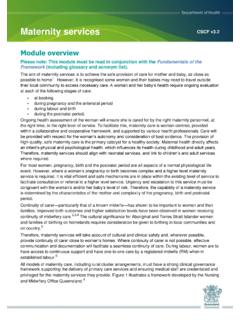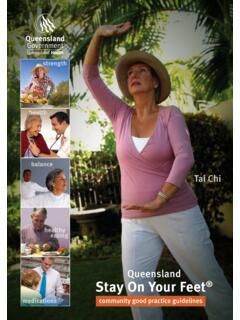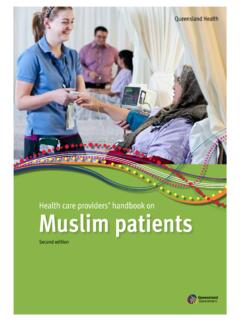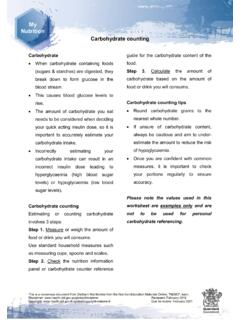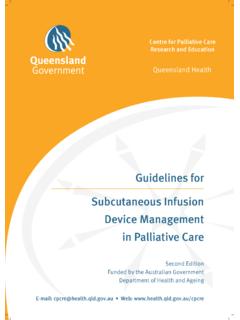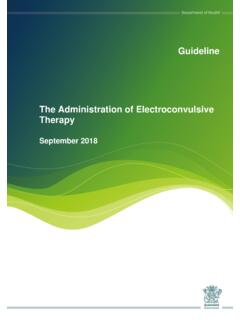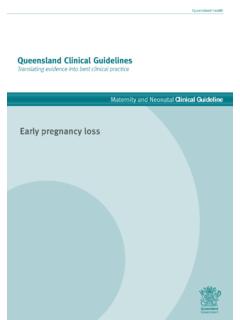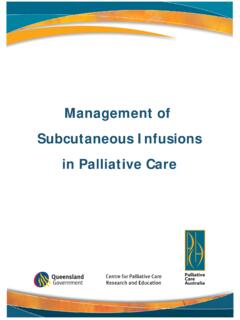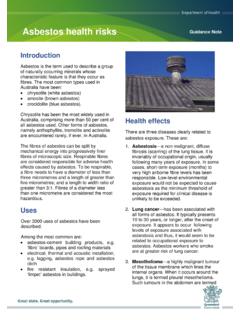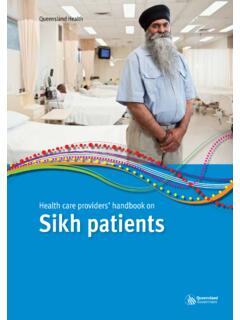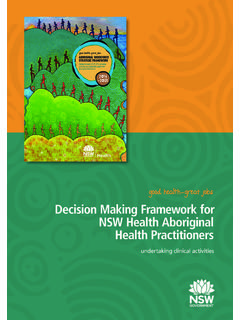Transcription of Aboriginal and Torres Strait Islander adolescent sexual ...
1 Queensland health Aboriginal and Torres Strait Islander adolescent sexual health guideline Queensland health Acknowledgment The Aboriginal and Torres Strait Islander adolescent sexual health guideline was researched and developed in partnership between the Nursing and Midwifery Office, Queensland, and the Aboriginal and Torres Strait Islander Cultural Capability Team. Thanks are extended to the many adolescents and Queensland health staff who were involved, and to a number of non-government organisations for their input and feedback. Aboriginal and Torres Strait Islander adolescent sexual health guideline Published by the State of Queensland (Queensland health ), May, 2013. This document is licensed under a Creative Commons Attribution Australia licence. To view a copy of this licence, visit State of Queensland (Queensland health ) [2013].
2 You are free to copy, communicate and adapt the work, as long as you attribute the State of Queensland (Queensland health ). For more information contact: Cultural Capability Statewide Team PO Box 48. Brisbane QLD 4000. (07) 3646 4048. Reprinted August 2015. QH598 08/15. Aboriginal and Torres Strait Islander adolescent sexual health guideline Contents 4. 4. About this 4. Section 1: Culturally capable adolescent sexual and reproductive 5. Barriers to adolescent sexual 5. Planning and providing a 7. Cultural capability before you 8. Relationships 9. Effective communication in the Contact Section 2: Cultural background to Aboriginal and Torres Strait Islander adolescent sexual Aboriginal and Torres Strait Islander adolescents and 17. Sex, sexuality and Aboriginal and Torres Strait Islander health seeking behaviours and trans-generational grief and trauma.
3 19. Aboriginal and Torres Strait Islander lesbian, gay, bisexual, transgender and Appendix 1: Social 20. Appendix 2: Psychosocial Appendix 3: Online 22. Queensland health Background Understanding how culture, traditions, customs and history can influence health is integral to providing effective and culturally competent healthcare for young Aboriginal and Torres Strait Islander people. The provision of sexual health services must include careful consideration of physical, spiritual, cultural, emotional and social well-being, community capacity, and strong governance. Aim The aim of the Aboriginal and Torres Strait Islander adolescent sexual health guideline is to provide health professionals with relevant insight into Aboriginal and Torres Strait Islander cultural and historical influences, and to guide their practice so that they can deliver culturally competent sexual healthcare to Aboriginal and Torres Strait Islander adolescents.
4 Intended users include medical officers, nurses and Aboriginal and Torres Strait Islander health workers who deliver and manage primary and sexual health services. It must be acknowledged that individual adolescents will have significant differences in culture, beliefs, perspectives and behaviours. This guideline is therefore not intended to be prescriptive, but to provide general guidance for those providing healthcare to Aboriginal and Torres Strait Islander adolescents. About this guideline The guideline was developed by an Indigenous sexual health clinical nurse consultant through literature research, consultation with stakeholders including Aboriginal and Torres Strait Islander adolescents and providers of sexual healthcare to Aboriginal and Torres Strait Islander adolescents, in a range of settings in Queensland.
5 Many informative quotes that illustrate challenges and advice are included throughout the guideline. The authors are grateful for the time, insight and wisdom provided by those who generously participated. Section 1 provides guidance on providing culturally capable sexual healthcare for Aboriginal and Torres Strait Islander adolescents. Section 2 provides additional background information which enables greater cultural and historical understanding. It is highly recommended that Section 2. be read, in particular by clinicians new to this area of work. Further resources are included in the Appendices. 4. Aboriginal and Torres Strait Islander adolescent sexual health guideline Section 1: Culturally capable adolescent sexual healthcare In seeking sexual healthcare, feeling protected, empowered and culturally safe is important for the Aboriginal and Torres Strait Islander young person.
6 How you present yourself and interact will have a significant impact on how they respond to you, how the consultation will go, their health outcomes, and whether they return to see you for future healthcare. The benefits of a culturally safe and respectful health service include: improved attendance, participation and satisfaction in treatment increased level of confidence and ownership/self empowerment for the patient due to their capacity to understand information, prevention, diagnosis, treatment, and management of their own health reduced likelihood of misunderstandings and errors related to diagnosis, treatment, and overall healthcare high levels of respect and reputation (personal and professional) between the patient, health practitioner, community and service improved health outcomes. Barriers to adolescent sexual healthcare Reasons that adolescents may delay seeking sexual healthcare include: not knowing who to talk to or what services to access for assistance lack of knowledge and understanding of sexually transmitted infections, their symptoms and the serious consequence to their health uninformed and/or unsupportive family members and friends believing that the symptoms will subside on their own (self treating or seeking advice elsewhere, for example from friends or the internet).
7 sexual assault culturally unresponsive or incompetent health service and staff previous bad experience with health services location of services and costs of services, medications and transport shame of having to discuss their problem with a health worker shame of having to have an examination fear of treatment when presenting to a health service fear that others will be aware of their problem and people in the community will talk about them, or breach of confidentiality. In particular, shame' may be a powerful barrier. The concept of shame' is more than just a feeling of embarrassment for Aboriginal and Torres Strait Islander people. It is associated with deep-seated feelings of inadequacy and disempowerment. Feeling shame is a reflection of how the young person feels about themselves and their associated feelings of self doubt.
8 Shame also may involve feeling outcast and ostracised from friends and family, which is particularly relevant to the high value of group belonging in Aboriginal and Torres Strait Islander cultures. 5. Queensland health Shame can impact on an adolescent 's level of knowledge. sexual behaviour is not openly discussed in Aboriginal and Torres Strait Islander cultures; therefore a young person may lack the knowledge or may have some misunderstanding or stigma attached to sexually transmitted infections. Consequently, disclosing and discussing sexual health matters may be viewed as breaching cultural practices and can evoke feelings of shame' or internal disharmony. Disclosure may take some time and when information is shared it may not be provided with clarity. The adolescent may be shame' to describe symptoms or be examined.
9 sexual health workers will need to be patient and use alternative strategies such as story telling, diagrams and/or examples to try and extract the information. Once information is shared, it is critical that the sexual health worker avoids causing further shame. If the adolescent feels that they are being judged for being promiscuous or perceived as being unintelligent for catching a sexually transmitted infection (STI), this can also cause feelings of shame and may result in the adolescent not returning or accessing any service. If an adolescent perceives, or is aware of, breaches of their privacy, this will also cause shame. sexual health workers must take the necessary steps to ensure that the adolescent understands confidentiality policies and procedures and is confident that their privacy will be respected.
10 There is also shame attached to paying for a service (for example on their mother's healthcare card). or getting a prescription filled at the local pharmacy because of the shame attached to the chemist knowing what you have'. This is particularly more acute in rural and/or remote communities where family members or relatives could work in the service or pharmacy. Summary of key factors for effective services The effective provision of sexual healthcare to Aboriginal and Torres Strait Islander adolescents is dependent on a number of key factors. These are summarised and further described under the four principles of the Queensland health Aboriginal and Torres Strait Islander Cultural Capability Framework 2010-2033. Cultural respect and recognition Recognise your own cultural perspectives, attitudes and beliefs.
